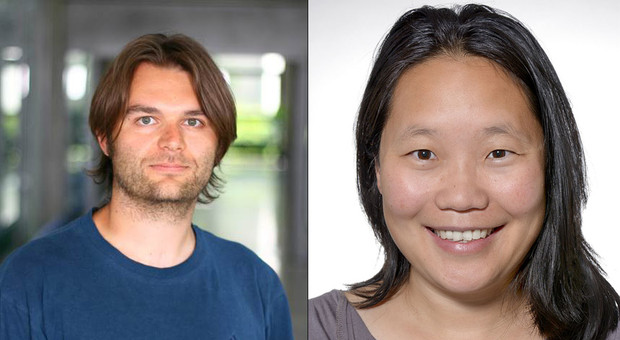Eva Hoffmann, PhD, from the University of Sussex, Great Britain and Esben Lorentzen, Max Planck Institute of Biochemistry, Germany, have been selected as the first two recipients the Novo Nordisk Foundation’s Young Investigator Awards.
These two younger independent investigators will now be pulling up stakes and establishing their laboratories in Denmark; Esben Lorentzen at Aarhus University and Eva Hoffmann at the University of Copenhagen.
The Foundation’s Young Investigator Awards will support each of their research programs with DKK 20 million over 7 years.
“With the new Young Investigator Awards, the Novo Nordisk Foundation aims to bring some of the world’s most talented and promising younger researchers to Denmark. These awards will support their establishment of outstanding research programs and strengthen Danish research both now and in the future”, says Novo Nordisk Foundation CEO Birgitte Nauntofte.
About receiving the NNF Young Investigator Award, Esben Lorentzen says:
“I am very excited to join the vibrant scientific community at the department of Molecular Biology and Genetics at Aarhus University. The expertise and state-of-the-art equipment at the Structural Biology unit will provide my research group with the optimal conditions to tackle difficult research questions going forward. The NNF Young Investigator Award provides me with the necessary funding to move my research group to Denmark and contribute to the excellent biomedical research programs in place. Furthermore, given the competitiveness of the award, it provides recognition and acknowledgement of the quality of our research.”
For Eva Hoffman, the Young Investigator Award enables a major advancement:
“I have been looking for the right environment to combine basic and translational research in reproductive medicine, and the NNF Young Investigator Award will provide me with a great opportunity in Denmark, allowing me to lead an international consortium to map out chromosome changes in the human germline. I will be joining the Danish National Research Foundation’s Center for Chromosome Stability (CCS), a Center of Excellence based in the Department of Cellular and Molecular Medicine at the University of Copenhagen. I have been particularly impressed with how much research clinicians conduct and their willingness to collaborate in order to provide synergy and added value by combining basic science and medical studies.”
ABOUT THE 2015 GRANT RECIPIENTS AND THEIR RESEARCH PROGRAMS

ESBEN LORENTZEN, PHD
Moving to: Aarhus University, Department of Molecular Biology and Genetics
Cilia are thin hair-like structures on the surface of cells that have very different purposes depending on the type of cell. The functions of cilia include cell movement, communication and sensing changes the cell’s environment. If these structures do not work properly in humans, different diseases result depending on the defect and the type of cell. The research that Esben Lorentzen will conduct with his Young Investigator Award will reveal how cilia are formed and function at a detailed molecular level. Comparing normal and defective cilia will provide understanding of cilia diseases and guide new treatment strategies.

EVA HOFFMANN, PHD
Moving to: University of Copenhagen, Department of Cellular and Molecular Medicine, Center for Chromosome Stability
The ability of chromosomes to interact with each other and to separate as individual chromosomes to produce eggs and sperm is fundamentally important for human health and reproduction. As significant as these processes are, many details about them are still not known. Eva Hoffmann’s Young Investigator Award research will use comprehensive and high-resolution methods to study how chromosomes are transmitted from parent to child, with a special focus on how ageing increases the frequency of abnormalities in women’s eggs. This will shed light on genetic and physical factors that can affect fertility as well as cause genetic disorders.
ABOUT NOVO NORDISK FOUNDATION YOUNG INVESTIGATOR AWARDS
The NNF Young Investigator Award program has been created to enable highly talented younger scientists located outside of Denmark to establish their labs in Denmark. These grants will support independent early- to mid-career researchers who are ready to conduct more ambitious studies within biomedicine and biotechnology. Young Investigator Awards are granted through a two-stage application process following an open Call for Applications.
Each award is up to DKK 20 million, which can be used for research program costs including project operations, salaries and equipment. Funding up to DKK 2.5 million per year is available for 7 years, with up to DKK 5 million in the first year for establishing the lab at the Danish institution.
FURTHER INFORMATION
John Wittschieben, Senior Scientific Officer, [email protected]
Christian Mostrup Scheel, Press Officer, [email protected]








